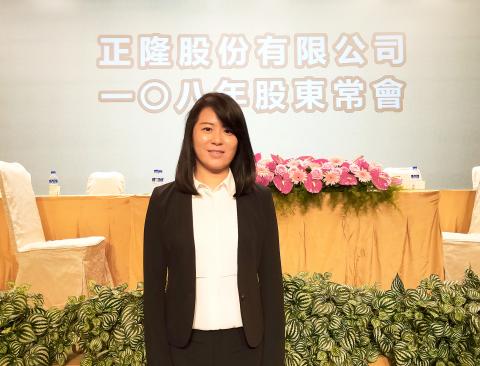Leading industrial papermaker Cheng Loong Corp (正隆紙業) yesterday said that it would continue building new plants and expanding manufacturing facilities in Vietnam.
“We will continue to expand our Binh Duong plant and expect to complete the expansion in 2021,” Cheng Loong president Tsai Tong-ho (蔡東和) said at its annual shareholders’ meeting in Taipei.
“We also plan to invest US$10 million to establish another corrugated packaging plant in northern Vietnam,” he said.

Photo: Lee Chin-hui, Taipei Times
In December last year, the company completed construction of a paper and paperboard mill in Binh Duong Province with an annual output of 300,000 tonnes, and began operations at its third corrugated packaging plant in Long An Province in the first quarter of this year, Tsai said.
As a result, the sales contribution from Vietnam is expected to increase from 6 percent of the company’s total sales last year to about 10 percent this year, he said.
Over the next four years, Cheng Loong plans to invest NT$2.08 billion (US$66.01 million) in setting up new plants in Kaohsiung’s Yanchao District (燕巢), as the paper industry reported a 7.5 percent increase in domestic sales and a 2.2 percent growth in exports last year.
Taiwan remains the largest market for Cheng Loong, accounting for about 69.4 percent of its sales last year, company data showed.
In contrast, the company has over the past few years been lowering the output of its corrugated packaging plants in China, and would continue to do so this year amid the US-China trade dispute, Cheng Loong chairwoman Cheng Su-yun (鄭舒云) said.
Sales contributions from China dropped to 24.6 percent of the total last year, compared with 41.1 percent in 2015, company data showed.
Cheng Loong is the largest waste paper buyer in Taiwan and sources about two-thirds of the paper it needs domestically, although it costs NT$3.5 to NT$4 per kilogram, which is higher than the NT$3 it could pay for imported paper.
The company said it would still source most of its waste paper in Taiwan for the sake of quality.
Shareholders yesterday approved the company’s plan to distribute a cash dividend of NT$1.1, representing a payout ratio of 32.54 percent based on last year’s earnings per share of NT$3.38.
It also suggests a dividend yield of 5.66 percent based on the stock’s closing price of NT$19.45.
A harsher industry environment saw Cheng Loong’s net income plummet by 77.68 percent to NT$438.24 million in the first quarter, compared with NT$1.96 billion in the same period last year, while earnings per share dipped from NT$1.77 to NT$0.4. However, gross margin climbed 5.05 percentage points to 21 percent.
In the first five months, the company’s cumulative revenue dropped 8.45 percent to NT$15.69 billion, compared with NT$17.14 billion a year earlier.

To many, Tatu City on the outskirts of Nairobi looks like a success. The first city entirely built by a private company to be operational in east Africa, with about 25,000 people living and working there, it accounts for about two-thirds of all foreign investment in Kenya. Its low-tax status has attracted more than 100 businesses including Heineken, coffee brand Dormans, and the biggest call-center and cold-chain transport firms in the region. However, to some local politicians, Tatu City has looked more like a target for extortion. A parade of governors have demanded land worth millions of dollars in exchange

An Indonesian animated movie is smashing regional box office records and could be set for wider success as it prepares to open beyond the Southeast Asian archipelago’s silver screens. Jumbo — a film based on the adventures of main character, Don, a large orphaned Indonesian boy facing bullying at school — last month became the highest-grossing Southeast Asian animated film, raking in more than US$8 million. Released at the end of March to coincide with the Eid holidays after the Islamic fasting month of Ramadan, the movie has hit 8 million ticket sales, the third-highest in Indonesian cinema history, Film

Taiwan Semiconductor Manufacturing Co’s (TSMC, 台積電) revenue jumped 48 percent last month, underscoring how electronics firms scrambled to acquire essential components before global tariffs took effect. The main chipmaker for Apple Inc and Nvidia Corp reported monthly sales of NT$349.6 billion (US$11.6 billion). That compares with the average analysts’ estimate for a 38 percent rise in second-quarter revenue. US President Donald Trump’s trade war is prompting economists to retool GDP forecasts worldwide, casting doubt over the outlook for everything from iPhone demand to computing and datacenter construction. However, TSMC — a barometer for global tech spending given its central role in the

Alchip Technologies Ltd (世芯), an application-specific integrated circuit (ASIC) designer specializing in server chips, expects revenue to decline this year due to sagging demand for 5-nanometer artificial intelligence (AI) chips from a North America-based major customer, a company executive said yesterday. That would be the first contraction in revenue for Alchip as it has been enjoying strong revenue growth over the past few years, benefiting from cloud-service providers’ moves to reduce dependence on Nvidia Corp’s expensive AI chips by building their own AI accelerator by outsourcing chip design. The 5-nanometer chip was supposed to be a new growth engine as the lifecycle